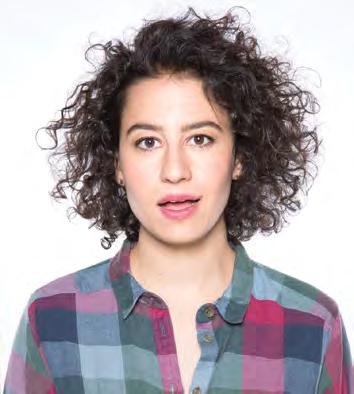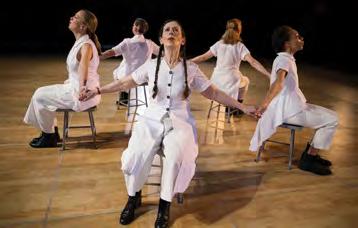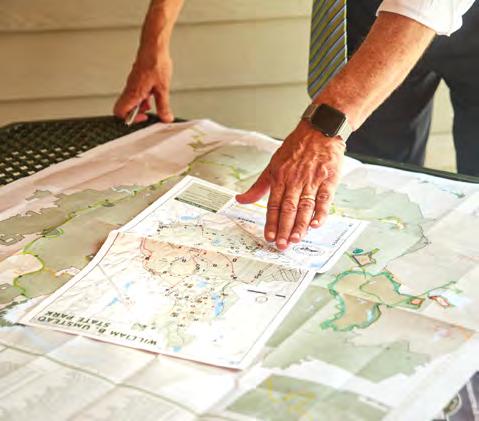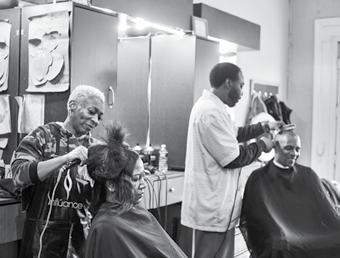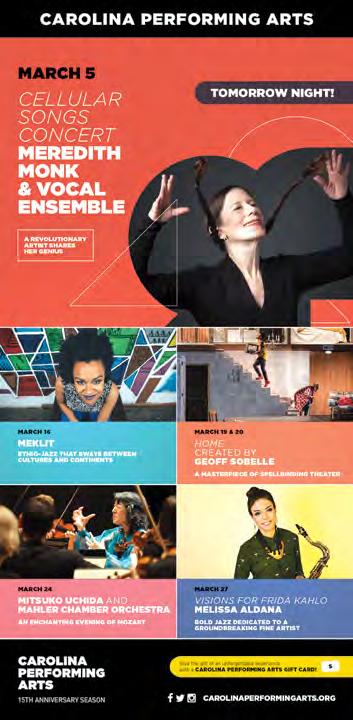M U SIC
Meredith Monk & Vocal Ensemble
MEREDITH MONK & VOCAL ENSEMBLE: CELLULAR SONGS
Thursday, Mar. 5, 7:30 p.m. | $27 | UNC’s Memorial Hall, Chapel Hill
PHOTO BY JULIETA CERVANTES
Cell Theory The infinite compassion of Meredith Monk’s Cellular Songs BY JUSTIN TORNOW music@indyweek.com
M
eredith Monk is world-renowned for her interdisciplinary explorations of the voice as an expressive, mostly nonverbal instrument. Her six-decade body of work integrates music, movement, and visuals in deeply poignant performances. Cellular Songs, her celebrated concert with her vocal ensemble, explores the activity of the fundamental element—the cell—to present an alternative template for human action and interaction. In a way, the piece grew out of On Behalf of Nature, which Monk spent some time developing at Duke University. Before Monk brings the concert to Carolina Performing Arts on March 5, we spoke with her about the piece’s genesis and process and how they connect to the foundation of human values that permeate her work. INDY: On Behalf of Nature is sort of a precursor to Cellular Songs, right? I have heard you draw parallels between cells in music, the human body, and the universe, and it seems like these correlations would provide lots of layers and textures. MEREDITH MONK: Oh yes, of course. Many of my pieces are inspired by nature, but Cellular Songs is very concerned with the ecological situation of the Earth. Even the way we made the piece, we were thinking from an ecological point of view: For example, if you have all these costumes and then they sit in storage somewhere, how could you make a piece that doesn’t leave a footprint? Basically, we recycled our own personal clothing, and then Yoshio Yabara, our costume designer, patched together all these pieces to create the costumes. We even did an exhibit in the lobby, where he did drawings of each of our costumes, and we each wrote about what the pieces of clothing had been. This was all very close to the Claude Lévi-Strauss concept of bricolage, about taking something ordinary and repurposing it. I knew that, because my work is largely nonverbal, I wasn’t going to be able to make a piece that says, “Please don’t use plastic” or be specific or overtly political. In a way, On Behalf of Nature was a kind of elegy, suggesting what is at stake if we don’t adjust. I thought it could be helpful to make people look at things or listen to things differently when they were in nature. In On Behalf of Nature, I wanted to use music and gesture to suggest the rhythms, the energies, the motors of nature—not reproducing or illustrating but evoking. Cellular Songs 28
March 4, 2020
INDYweek.com
extends that concept deeper into the organism, breaking reality down into the fundamental unit of life, the cell. When I started working on the piece around 2014—just working at the keyboard, I didn’t know it was “the piece” yet—I was laying these very intricately woven vocal layers. I picked up a book called The Emperor of All Maladies by Siddhartha Mukherjee. The book is basically on the history of cancer, going all the way back to ancient times. What struck me was his description of the intelligence of a cell, and how the processes are so complex and interdependent. It’s a very cooperative situation. When you multiply that by billions to make up these miracles—our instruments, our bodies—the cells have got to cooperate. So I started thinking, “Isn’t this an incredible metaphor for what’s going on in our society?” I think I was already sensing what was coming up in the political realm: the patriarchal energy, a feeling of compression rather than expansion, limitation rather than openness, greed instead of generosity. I felt like it could be really interesting to make an abstract, poetic piece in response to these energies. Without having to be explicit about it. Yes, exactly. It’s all in there, though: In Cellular Songs, we’re offering an alternative that’s generous and kind and codependent instead of cruel. We were asking, “What does that look like? Showing kindness instead of cruelty, generosity instead of greed, collaboration rather than competition?” I was determined to have those values be all be part of the process itself. In a weird way, just the way we behave with each other becomes the subtext of the music and the gesture. How do we make our process itself feel energetically generative for the people who are making it? That’s become more important to me, the more desperate that things feel in the world around us. Exactly! I think this piece is a template for the possibility of human behavior, but also what you’re talking about in terms of the process. You can’t put your finger on it, it’s not delineated, but you can feel it. It becomes part of the energetic atmosphere of the performance. And you’d never get to those states if that hadn’t been your process. You know what I mean?
Yes! I’m nodding vigorously! Another thing that started with On Behalf of Nature and really came into focus on Cellular Songs is that, because my music has become so complex, I have to figure out a way to simplify the movement and gestural aspects. And it scared me, feeling like, “Oh my god, would this be too simple?” Because we live in a very visual culture, and as soon as you put movement to music, the music becomes accompaniment. So my question was, how do I make it so that the music is actually the continuity and the core, and then any other elements become so transparent that you still can perceive the complexity of the music? The audience in Chapel Hill should know that the foreground of our Cellular Songs concert version is the singing—don’t expect that the movement will be the foreground. But as you’ll see, it’s still very embodied. And there’s humor. Why can’t a piece include tragedy and comedy and everything, all in one? Some of the most brilliant pieces I’ve seen like this are films. Roberto Rossellini’s The Open City is about horrifying times in WWII during the occupation, but there’s such a funny scene in that film. And I think you have to have that kind of release when you’re doing something that deep. It’s like you get so full with all the tragedy, it’s nice to have the opportunity to drain a little bit so that you have some room to feel deeply again. Yes, and speaking of these layers, right now I’m making the album of Cellular Songs, and I’m rewriting a little bit. I’m bringing other instruments in so that you can get as full of an experience aurally as you would get seeing it live. You know, since we can’t dance on an album! [laughs] An essay you wrote had a huge impact on me, specifically the kind of language you used around process. You used the word “multi-perceptual.” Yeah, I like it better than “interdisciplinary.” Artists should attend to a variety of ways a work can be perceived. I say this to my students at Harvard, especially electronic composers: “How do you want this to be seen? Take into account that we also have eyes!” And with dance students, it’s good to talk about how you want the dance to be heard and the possibilities of perception in terms of the vantage point of the audience.


